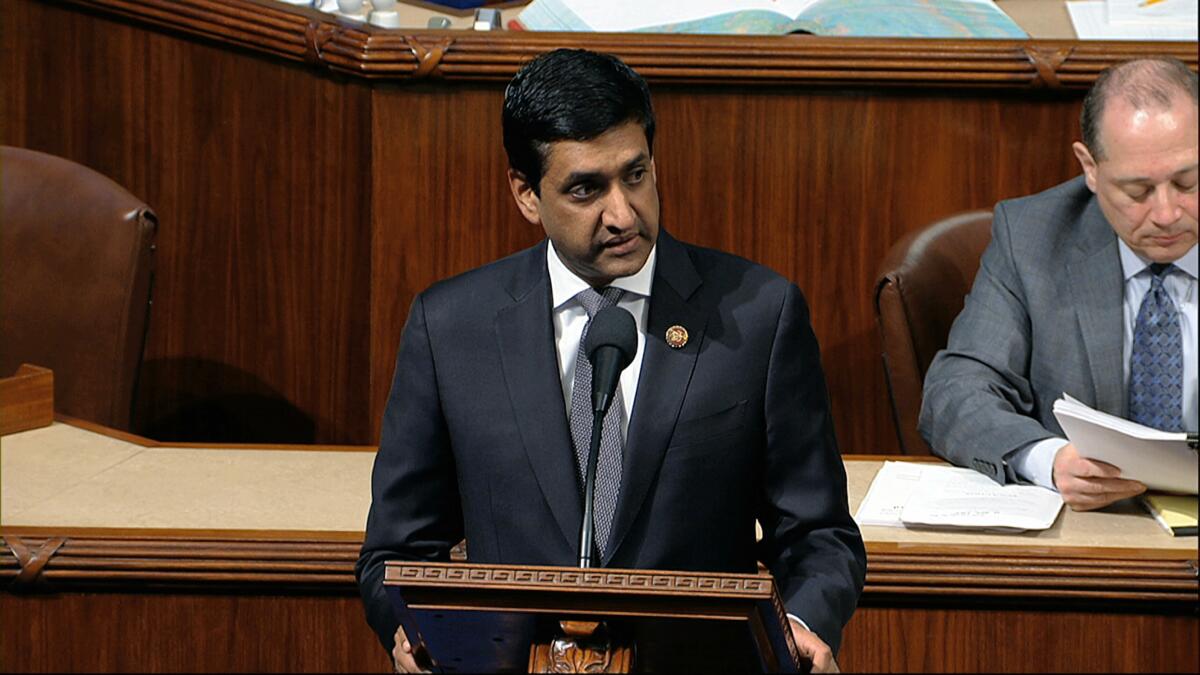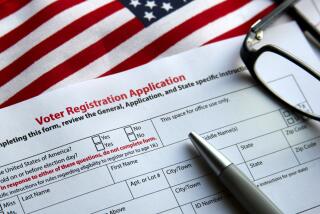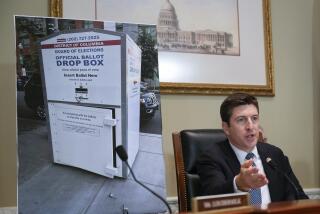House members are using proxy voting for reasons far beyond its original intent

- Share via
WASHINGTON — Rep. Karen Bass voted by proxy in the House last week as she filed paperwork in Los Angeles to run for mayor. Rep. Mo Brooks did the same to campaign for a Senate seat, tweeting a picture of himself shaking hands with Alabama Republicans.
Rep. Ro Khanna used proxy voting while sitting in a car in the Capitol parking lot, doing an online interview about his new book.
Nearly two years into Congress’ first foray into allowing House members to vote remotely, lawmakers are using the practice for a wide array of reasons not originally intended.
Proxy voting was set up by the House in May 2020 in an attempt to slow the spread of the coronavirus by reducing the need to travel to Washington and preventing hundreds of lawmakers from gathering on the House floor at once.
To participate, lawmakers signed a document saying the COVID-19 pandemic prevented them from voting in person. They appoint another member to cast a vote on their behalf.
Speaker Nancy Pelosi (D-San Francisco) will decide how long to keep the practice. So far she has approved it through March 30.
While many members have used proxy voting to avoid travel during the pandemic, it has also been used to attend the Conservative Political Action Conference, to campaign, to spend time with newborns and sick relatives and to recover from illnesses.
Khanna (D-Fremont) conducted an online video interview with the Philadelphia Inquirer regarding his new book from a car, telling the interviewer that he had just stepped out of the U.S. Capitol into the parking lot.
He has frequently voted by proxy this year and defended the practice as an adaptation Congress made during the pandemic, similar to every American workplace.
“It’s important to limit the number of members on the floor at any time to reduce the risk of exposure to COVID-19. Like members of both parties, I have used proxy voting on several occasions,” he said in a statement to The Times.
Khanna said Congress should make permanent some kind of remote voting.
“Congress ought to come into the 21st century by adopting electronic voting,” he said. His book highlights the adaptations Silicon Valley tech companies have made to allow for more remote work during the pandemic.
As the 2022 midterm elections begin, proxy voting also allows lawmakers to essentially be in two places at once. In the past, candidates in a similar spot found themselves tied to Washington to vote, lest they risk looking as though they weren’t fulfilling their job. Or they skipped votes to hit the trail.
Rep. Charlie Crist (D-Fla.), now running for governor, has been a prolific proxy voter this year. Crist held three news conferences this year while the House was in session and voting, in one case at the exact same time as House votes. His office did not respond to a request for comment.
Bass (D-Los Angeles) filed her mayoral paperwork last week as the House was wrapping up a short session of votes.
“Workplaces are changing every day and the House is no exception,” said Zach Seidl, a Bass spokesperson. “In accordance with House rules, like roughly 80% of members have done, Rep. Bass has voted by proxy.”
Though many Republicans initially opposed proxy voting, some, such as Brooks, have embraced it. His office did not respond to requests for comment.
Rep. Louie Gohmert (R-Texas), who is pursuing his state’s attorney general post, was a vocal opponent of proxy voting when it was established. But this year, he has conducted nearly all of his votes by proxy.
So has Rep. Henry Cuellar (D-Texas), who is facing a heavily contested primary on March 1 as well as a recent FBI raid on his home and campaign office. Cuellar said the ongoing investigation will show “there was no wrongdoing on my part.”
As of December, roughly 80% of lawmakers had used proxy voting at least once, according to a Brookings Institution analysis.
But as usage increases for reasons unrelated to the COVID-19 pandemic, experts warn it could be harder to defend retaining some kind of proxy voting system in the future.
“The more examples we have of people using it because it is more convenient to them than physically going to vote, the harder it gets to devise a system that actually makes it available for people when they need it,” said Molly E. Reynolds, a senior fellow at the Brookings Institution who has written extensively on proxy voting.
“There is a version of proxy voting that is a workplace accommodation for members who — for health reasons, their own or their families’, in the pandemic and beyond — have the ability to fulfill their responsibilities without having to be physically present,” Reynolds said. “What gets really difficult is figuring out how you police those boundaries.”
House Minority Leader Kevin McCarthy (R-Bakersfield) has warned that Republicans would ban the practice if the party takes control of the House next year. He has dismissed proxy voting as unconstitutional and suggested that only serious health issues warranted consideration, such as eye surgery for Rep. Dan Crenshaw (R-Texas,) a former Navy SEAL who had lost his other eye in Afghanistan.
“Through all the history of America, through war, through plagues ... even within the Civil War and Capitol being burned, we still showed up,” McCarthy said last year. “This is the first Congress that can’t.”
McCarthy and 160 other Republicans signed on to a 2020 lawsuit challenging proxy voting. Since then, the vast majority of them have removed their names from the suit and participated in proxy voting. In January, the Supreme Court refused to overturn the lawsuit’s dismissal by lower courts.
More to Read
Get the L.A. Times Politics newsletter
Deeply reported insights into legislation, politics and policy from Sacramento, Washington and beyond. In your inbox three times per week.
You may occasionally receive promotional content from the Los Angeles Times.











